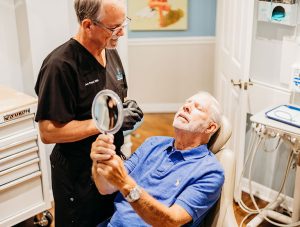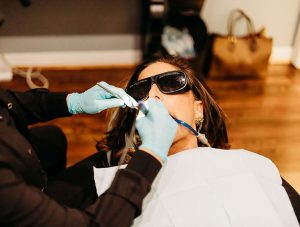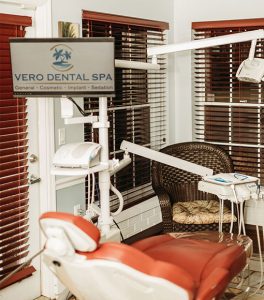Dental Crowns Can Give You a Beautiful Smile
Dental crowns restore damaged or decayed teeth, helping countless patients achieve beautiful, healthy smiles. Crowns can be made from various materials and are custom-made to fit each patient’s unique needs. At our Vero Beach dental office, our cosmetic dentist offers dental crowns to meet your oral health needs. Learn more about dental crowns and discover if this solution is the right fit for your smile by calling (772) 778-5550!

What Are Dental Crowns?
Dental crowns, also known as caps or tooth crowns, are prosthetic devices placed over damaged or decayed teeth to restore their function, shape, and appearance. They’re custom-made to fit over the entire tooth, from the gum line to the chewing surface, and are made of porcelain, ceramic, metal, or a combination of these materials. A dental crown can also be used on top of a dental implant, to support a dental bridge, or as a cosmetic solution to improve the appearance of teeth.
Vero Dental Spa Offers a Full Suite of Dental Services for Your Benefit
As a 5-star rated dentist in Vero Beach, FL, we’re committed to providing every patient with excellent dental care. Dr. Royal, a Diplomate of the International Dental Implant Association, has practiced general dentistry in South Florida for over 27 years. With vast experience in dental care, he can bring your smile back to life.
To receive your complimentary consultation or 2nd opinion, contact our dental office in Vero Beach by calling (772) 778-5550 today!
When Is a Dental Crown Necessary?
There are multiple dental issues that a crown can fix. Our Vero Beach dentist may recommend a dental crown for various reasons, including:
- Protecting a Weak Tooth: If a tooth has been weakened by decay, a large filling, or a root canal, a dental crown can provide additional support and prevent the tooth from breaking.
- Restoring a Broken or Damaged Tooth: A dental crown can be used to restore a tooth that has been broken, cracked, or severely worn down.
- Covering a Dental Implant: After a dental implant is placed, a dental crown is often used to cover the implant and create a natural-looking tooth replacement.
- Supporting a Dental Bridge: A crown can support a dental bridge, which is used to replace missing teeth.
- Improving the Appearance of a Tooth: Dental crowns can be used as a cosmetic solution to improve the appearance of misshapen, discolored, or poorly spaced teeth.
Signs You Need Dental Crowns
Some signs that you need a dental crown include:
- Tooth pain or sensitivity
- A cracked or chipped tooth
- A large filling that needs to be replaced
- A tooth that has undergone root canal therapy
- A tooth that’s misshapen or discolored
- To top dental implants
Benefits of Dental Crowns
Some of the benefits of dental crowns include:
- Restored tooth function
- Can strengthen a weak tooth
- Improved appearance
- Can stop tooth decay
- Support a dental bridge
- Top dental implants
- Long-lasting
- Supports adjacent teeth
- Boost in confidence
If you’re wondering how dental crowns may benefit you, contact our Vero Beach dentist today to schedule your next appointment!
Types of Dental Crowns
Porcelain Crowns
Porcelain crowns are made of a tooth-colored material that can be matched to the shade of your natural teeth, making them a popular choice for front teeth. They’re biocompatible and produce a natural, lifelike appearance.
Metal Crowns
Metal crowns are made of gold, nickel, or other metal alloys. They’re extremely durable and can withstand heavy biting forces and last a long time. However, their metallic color makes them less popular for front teeth.
Porcelain-fused-to-Metal Crowns (PFM)
PFM crowns are made by fusing a metal base with a porcelain coating, providing the strength of the metal and the aesthetics of the porcelain. They can be used for both front and back teeth.
Zirconia Crowns
Zirconia crowns are made of a durable, biocompatible material that is resistant to chipping and cracking. They can be matched to the color of your natural teeth and are an ideal option for back teeth.
Same-Day Crowns
Same-day crowns, also known as CEREC crowns, are a type of dental crown that can be fabricated and placed in a single dental visit. This is in contrast to traditional dental crowns, which typically require multiple appointments and the use of temporary crowns while waiting for the permanent crown to be fabricated in a dental lab.
The Dental Crown Procedure
Initial Consultation and Examination
The process begins with a thorough examination by our dentist. This includes evaluating the tooth that requires a crown, taking X-rays to check the roots of the tooth and the surrounding bone, and determining if there’s any decay or damage that needs to be addressed.
Dr. Royal will discuss the need for a crown, the type of material that would be best suited, and what you can expect during the procedure.
Tooth Preparation
To ensure your comfort, local anesthesia is administered to numb the area around the tooth. Our Vero Beach dentist will reshape the tooth to make room for the new crown. This involves removing some of the natural tooth structure so that the crown can fit properly. If a large area of the tooth is missing due to decay or damage, we may use a filling material to build up the tooth to support the crown.
Once the tooth is prepared, we’ll take a digital impression of the reshaped tooth and the surrounding teeth. This impression is critical for creating a crown that fits perfectly.
A temporary crown is then placed over the prepared tooth to protect it while the permanent crown is being made. This temporary crown will be made of acrylic or composite material and will be cemented in place until your next visit.
Crown Fabrication
The impression or digital scan of your tooth is sent to a dental laboratory, where skilled technicians create your custom crown. The crown is made to match the size, shape, and color of your natural teeth, ensuring that it blends seamlessly with your smile. This typically takes one to two weeks.
Fitting and Adjusting the Crown
When your permanent crown is ready, our dentist will remove the temporary crown. This is usually a quick and painless process. Dr. Royal will place the new crown on your tooth and check the fit and color. Adjustments may be made to ensure that the crown is comfortable and that your bite is correct.
Once the fit is perfect, the crown is permanently cemented onto your tooth. We’ll clean the tooth and then use a special dental cement to bond the crown securely in place.
Final Adjustments and Aftercare
After the crown is cemented, our dentist will check your bite again to ensure that the crown does not interfere with your chewing. If needed, minor adjustments can be made.
You’ll receive instructions on how to care for your new crown. While dental crowns are durable, maintaining good oral hygiene and avoiding hard foods can prolong the life of your crown. Regular dental check-ups will help monitor the crown’s condition and ensure your oral health remains optimal.
Dental Crown Cost
The average cost of a dental crown in Vero Beach ranges from $800 to $2,500 per tooth. Each patient is different and certain factors will affect your treatment cost, including:
- Dental crown material
- Location of the tooth
- Case complexity
- Dental insurance plan
To schedule a complimentary consultation, contact Vero Dental Spa today by calling (772) 778-5550.
Frequently Asked Questions
How long do dental crowns last?
Generally, dental crowns can last anywhere from five to 15 years or even longer with proper care. The lifespan of your dental crown will depend on various factors such as the material used, oral hygiene routine, and the amount of wear and tear the crown is subjected to. Porcelain and ceramic crowns tend to have a longer lifespan than metal or resin-based crowns.
Is it painful to get a dental crown?
Getting a dental crown should not be painful as the procedure is usually performed with a local anesthetic. Some patients may experience some discomfort or sensitivity during or after the procedure. Your dentist can prescribe pain medication or recommend over-the-counter pain relievers to manage any discomfort.
How long does it take to put a dental crown on a tooth?
Generally, it takes two dental visits to complete the dental crown placement process. The total time it takes to place a dental crown on a tooth can vary depending on the specific case and the dentist’s technique. Your dentist will provide a treatment timeline at your initial consultation.
Discover if Dental Crowns Are Right for You
Dental crowns are a popular and effective way to restore damaged or decayed teeth. Contact our dental office at (772) 778-5550 today to schedule a consultation with our dentist. We’ll evaluate your oral health and recommend the best treatment for you.

Get Your Complimentary
Consultation or 2nd Opinion
- Exam
- Full mouth X-ray
- Private Consultation with Doctor ($350 value)
- 3036 20th St,
Vero Beach, FL 32960 - (772) 778-5550
Working hours
- Monday: 8am - 5pm
- Tuesday: 8am - 5pm
- Wednesday: 8am - 5pm
- Thursday: 8am - 5pm
- Friday: 8am - 1pm
- Saturday & Sunday: Closed


